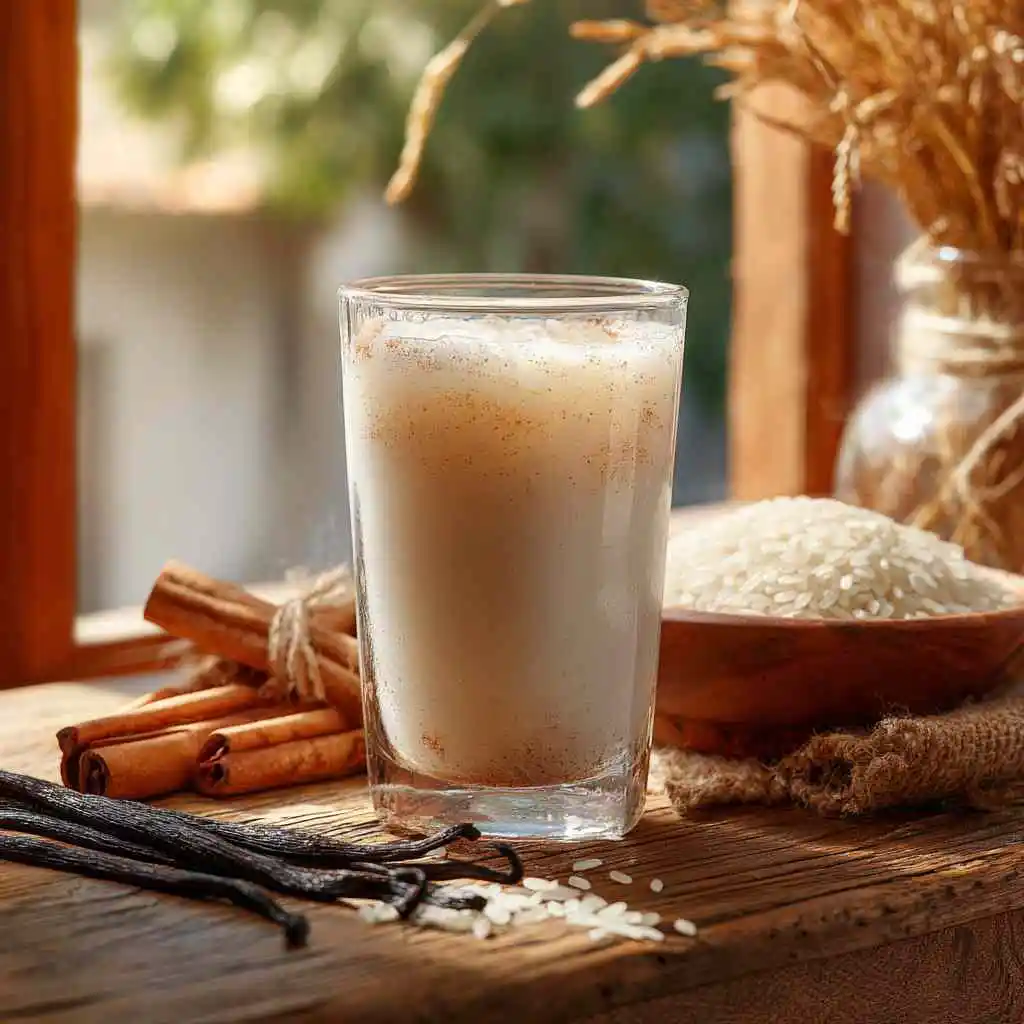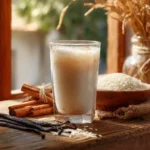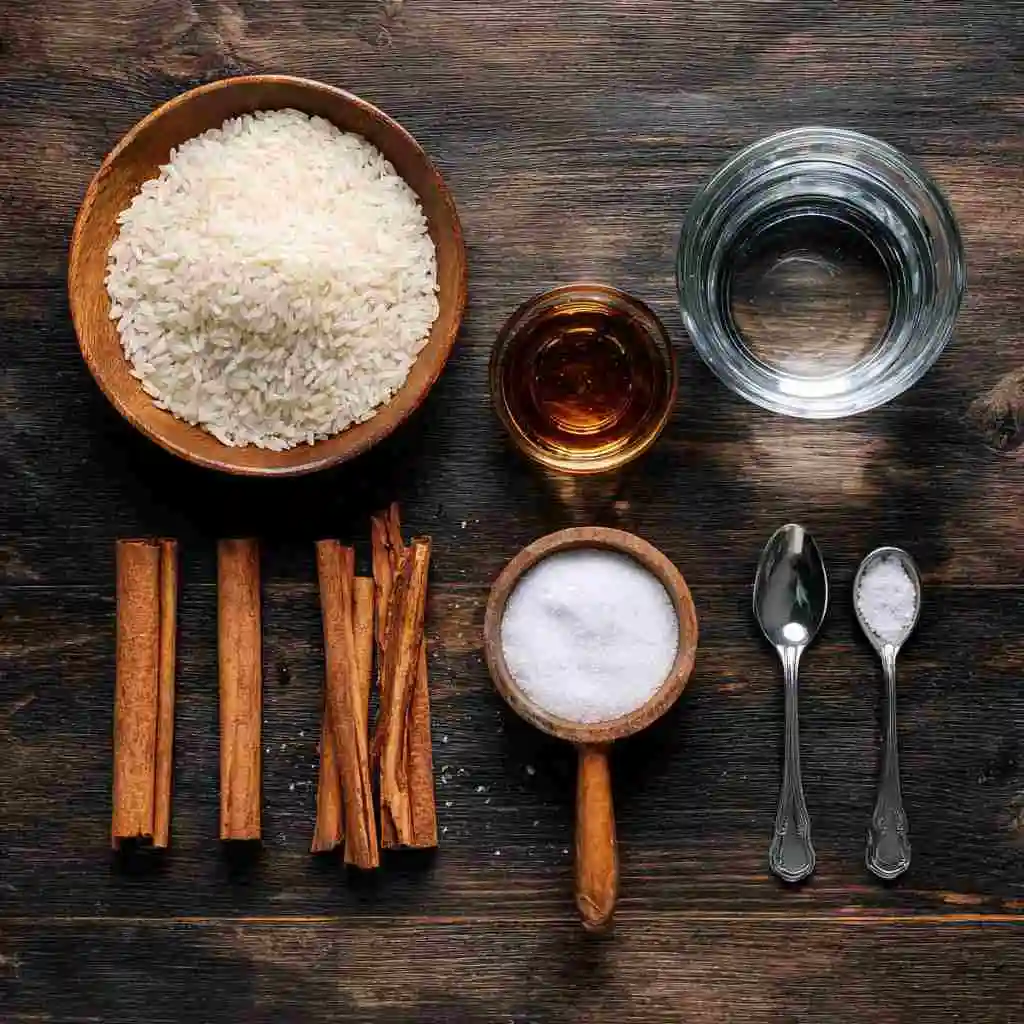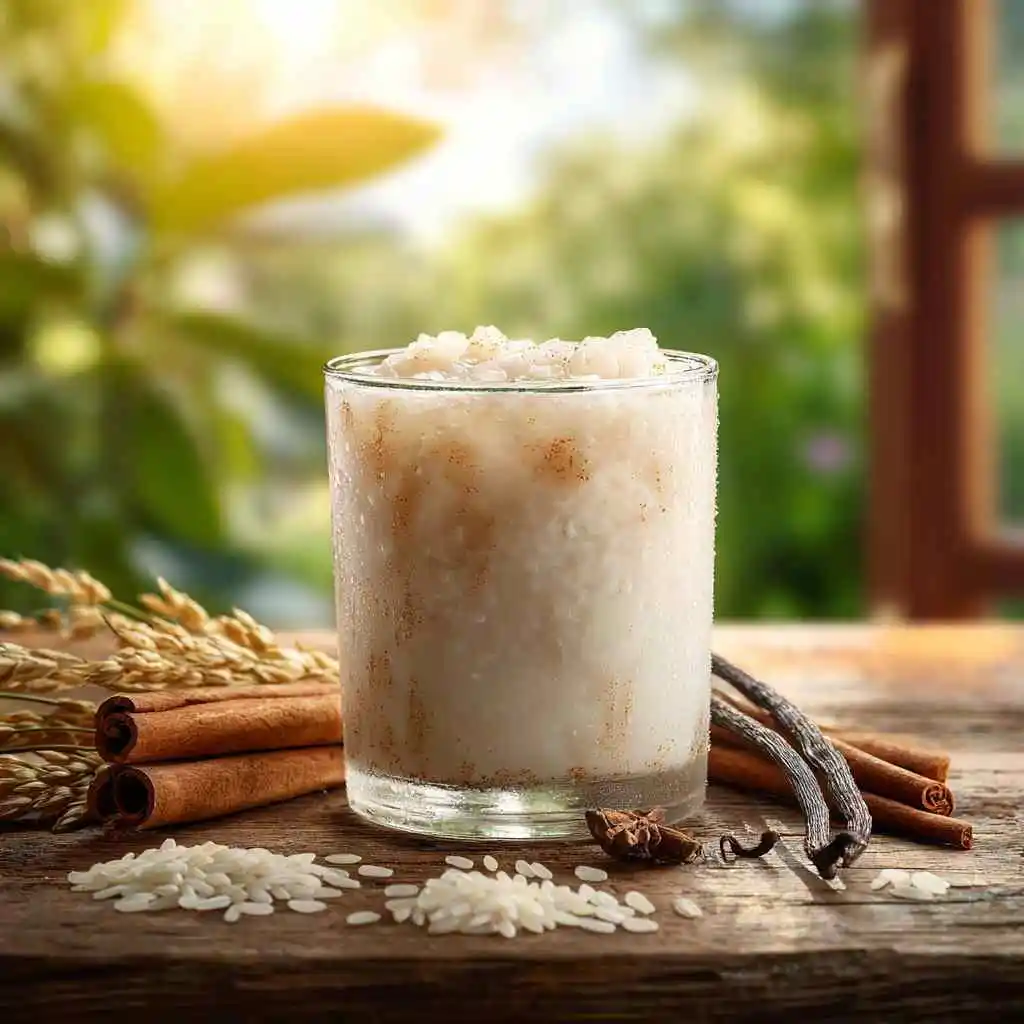
Horchata flavor is sweet, creamy, and layered with comforting notes of cinnamon and vanilla. Whether you’ve enjoyed it in a homemade glass or sipped a Starbucks version on the go, there’s something unmistakably nostalgic about it. In this article, we’ll explore everything that gives horchata its signature flavor—from traditional ingredients like soaked rice and spices to modern adaptations using oat milk and syrups. You’ll also learn how horchata flavor fits into drinks, desserts, and everyday meals. Whether you’re new to it or looking to deepen your appreciation, this guide has all the flavor insight you need.
Table of Contents

Horchata Flavor: What It Is, How It Tastes, and How to Make It
- Total Time: 4 hours 15 minutes
- Yield: 6 servings 1x
Description
Horchata flavor is sweet, creamy, and spiced with cinnamon. Discover what it tastes like, how it’s made, and why it’s so irresistible.
Ingredients
1 cup long-grain white rice
4 cups warm water
1–2 cinnamon sticks
½ to ¾ cup granulated sugar (to taste)
1–2 teaspoons vanilla extract
2 cups milk or almond milk (optional)
Ice cubes, for serving
Ground cinnamon, for garnish (optional)
Instructions
Rinse the rice under cold water until the water runs clear.
In a large bowl, combine rice, cinnamon sticks, and warm water. Cover and let soak for at least 4 hours or overnight.
Transfer the soaked mixture to a blender. Blend on high for 1–2 minutes until the cinnamon and rice are finely ground.
Strain the mixture through a fine mesh sieve or cheesecloth into a pitcher to remove solids.
Stir in sugar and vanilla extract. Adjust sweetness to your liking.
If desired, add milk or almond milk for a creamier texture.
Chill before serving. Serve over ice and sprinkle with cinnamon if desired.
Notes
For extra depth of flavor, toast the cinnamon sticks lightly before soaking.
You can substitute vanilla with almond extract for a nutty twist.
Horchata stores well in the fridge for up to 4 days. Shake before each use.
- Prep Time: 10 minutes
- Cook Time: 4 hours 5 minutes
- Category: Drinks
- Method: Soaking & Blending
- Cuisine: Mexican
Nutrition
- Serving Size: 180
- Calories: 180
- Sugar: 18g
- Sodium: 15mg
- Fat: 2g
- Saturated Fat: 0g
- Unsaturated Fat: 0g
- Trans Fat: 0g
- Carbohydrates: 38g
- Fiber: 1g
- Protein: 2g
- Cholesterol: 0mg
Keywords: Sweetened condensed milk, evaporated milk, white rice, Almond milk, grain white rice, mexican cinnamon sticks, hot
The Story & Flavor Magic of Horchata
Why Horchata Tastes Like Comfort in a Glass
Horchata flavor isn’t just sweet—it’s soulful. I first discovered it outside a taco truck at a street festival. I’d ordered spicy tacos and needed something to cool down. A pale, milky drink poured over ice looked inviting. One sip and I was transported. It was cool and creamy, like dessert and refreshment all in one. There was cinnamon warmth, a whisper of vanilla, and a hint of toasted rice. It tasted like a hug in a cup.
What I didn’t know then is that horchata has deep cultural roots. Originating in Spain from tigernuts and evolving in Latin America into a rice-based drink, horchata is both regional and personal. Mexican horchata—what most of us in the U.S. drink—is made with soaked rice, cinnamon sticks, vanilla, and sugar, blended smooth and poured over ice. Some people add milk for creaminess, while others keep it dairy-free. Either way, its flavor brings comfort.
From My First Sip to Homemade Success
I was so obsessed with recreating that flavor, I went home and started experimenting. My first attempt? Way too gritty. I didn’t soak the rice long enough, and I skimped on the cinnamon. But it was delicious anyway. There’s something about blending warm spice, mellow grains, and sweet creaminess that just works.
Over time, I learned to perfect it. I now make a big batch for weekend brunch or summer BBQs. Friends ask for the recipe every time. It’s even inspired some of my other recipes—like this slow cooker cinnamon hot chocolate, which leans into those same cozy notes. And when I want a lighter version, I turn to my almond milk chia pudding, which mimics that horchata flavor in a healthy, spoonable form.
Horchata flavor, to me, is more than taste—it’s a feeling. It’s the drink you crave when you want comfort without complication.
Horchata Ingredients & Preparation
Step-by-Step Breakdown of Traditional Horchata Flavor Layers
Creating that unmistakable horchata flavor starts with a few pantry staples and a little patience. A classic horchata recipe starts with soaked rice, whole cinnamon, a splash of vanilla, and a touch of sugar. When prepared correctly, these ingredients come together to form a creamy, spiced drink that’s refreshing and comforting all at once. Here’s the step-by-step process to make it from scratch:
Step 1:
Thoroughly wash 1 cup of long-grain white rice under cold running water. Transfer it to a large bowl, add one or two cinnamon sticks, then pour in 4 cups of warm water. Let this mixture soak uncovered at room temperature for 8 to 12 hours to soften the rice and extract the cinnamon’s oils.
Step 2:
After soaking, pour everything into a blender. Blend on high speed for about 2 minutes until the mixture becomes thick and the cinnamon is fully broken down. Blending at this stage releases the rich and complex flavors that define horchata.
Step 3:
Pour the blended mixture through a cheesecloth or fine mesh strainer to separate and discard the solids. You’ll be left with a smooth, creamy base that carries the essence of rice and warm spice.
Step 4:
Add between half and three-quarters of a cup of sugar along with one to two teaspoons of vanilla extract. For extra creaminess, add 1 cup of milk or a dairy-free alternative like almond milk or oat milk. This not only enhances texture but enriches the flavor.
Step 5:
Chill the mixture until cold. Serve over ice and top with a light dusting of cinnamon to highlight the drink’s naturally warm profile.

How Starbucks & Others Recreate Horchata Flavor
Modern cafés and commercial brands often create their version of horchata flavor using flavored syrups instead of soaking and blending real ingredients. These syrups typically contain artificial or natural flavors that mimic cinnamon, vanilla, and rice essence.
This shortcut makes mass production easier and allows consistent results, but it often leans toward excessive sweetness. For example, coffee chains may blend oat or almond milk with cinnamon syrup to replicate the taste of horchata, though the depth and balance are never quite the same.
These versions can still be enjoyable, especially when you’re craving something quick. But for those seeking a full-bodied, homemade horchata flavor experience, traditional preparation is the way to go.
Cooking Notes & Nutritional Insights
Understanding Horchata’s Sweetness, Spices & Calories
The horchata flavor is a delicate balance of creamy sweetness and warm spice. Sugar plays a key role here; it rounds out the mild rice base and complements the cinnamon’s subtle heat. Traditional recipes often use granulated sugar, but some variations include condensed milk or evaporated milk to add richness and natural sweetness.
Because horchata can vary widely depending on preparation, the calorie count fluctuates. A typical 8-ounce serving ranges from 120 to 200 calories, largely due to sugar and milk content. For those watching sugar intake, reducing the sugar or substituting with natural sweeteners like agave syrup or stevia works well without sacrificing much flavor.
Cinnamon isn’t just for taste—it also adds antioxidants and helps balance blood sugar. The warm spice combined with creamy texture makes horchata a comforting, yet refreshing drink, perfect for any season.
Store-Bought vs Homemade: Flavor Differences Explained
Many store-bought or commercial horchata versions use syrups and flavorings to imitate traditional taste. While convenient, these often have a sweeter, less complex profile. The authentic horchata flavor depends on soaking real rice and cinnamon, which releases starches and oils that syrups can’t fully replicate.
Below is a comparison table highlighting key differences:
| Aspect | Homemade Horchata | Store-Bought/Commercial |
|---|---|---|
| Main Ingredients | Soaked rice, cinnamon sticks, vanilla, sugar, milk (optional) | Flavored syrups, sweeteners, plant-based milks |
| Flavor Complexity | Rich, layered with natural starch and spice | Simpler, sweeter, often artificial |
| Sweetness Level | Adjustable; depends on added sugar | Usually very sweet, less customizable |
| Texture | Smooth with slight graininess from rice | Consistently smooth, thinner |
Understanding these differences helps when choosing between homemade or store-bought horchata. The homemade route offers authenticity and the ability to tailor sweetness and spice, while commercial options provide quick convenience.
Tips & Serving Suggestions

How to Use Horchata Flavor in Lattes, Desserts & More
The versatile horchata flavor isn’t just for drinking on its own—it works wonderfully in a variety of recipes. Adding a splash of horchata to your morning latte gives it a sweet, spicy twist that warms you up. You can recreate this by mixing horchata with strong brewed coffee or espresso and frothing some milk on top.
In desserts, horchata flavor shines in puddings, cakes, and even ice creams. It pairs especially well with cinnamon-spiced cakes or chocolate-based sweets, offering a creamy balance to rich flavors. Try incorporating it into pancake batter or smoothie bowls for a surprising hint of warmth and sweetness.
For a boozy take, mix horchata with rum or bourbon for a creamy cocktail with subtle spice and sweetness. It’s an easy way to impress guests with a drink that feels both exotic and comforting.
Best Ways to Serve Horchata for Any Occasion
Serving horchata cold over plenty of ice is classic, especially during warm weather. For added flair, garnish with a cinnamon stick or a light sprinkle of ground cinnamon. Some enjoy it with a wedge of lime on the side, which cuts through the sweetness and adds a refreshing zing.
In colder months, try warming horchata gently on the stove for a cozy beverage similar to a spiced latte. Pair warm horchata with holiday treats like gingerbread or apple pie for a seasonal delight.
If serving at parties, consider offering horchata alongside Mexican dishes like tacos, tamales, or enchiladas. Its sweet, spicy flavor complements savory and spicy foods perfectly, making it an ideal beverage choice.
Conclusion: The Comforting Magic of Horchata Flavor
The horchata flavor is more than just a blend of rice, cinnamon, and vanilla—it’s a tradition that spans cultures and generations. Whether you sip it ice-cold in the summer or warm it gently in cooler months, horchata delivers a uniquely smooth, spiced sweetness that satisfies every time.
Its versatility makes it perfect for more than just drinking. From horchata-flavored lattes to creative desserts and cozy cocktails, the flavor easily adapts to your tastes and occasions. Even store-bought versions bring a little warmth and comfort into daily routines, but nothing quite compares to homemade.
If you’ve never tried making it yourself, now’s the perfect time to experiment with rice, cinnamon sticks, and your preferred sweetener. The process is simple, and the result is a refreshing, nostalgic drink with a taste that lingers long after the last sip.
Explore, tweak, and enjoy the journey—horchata flavor has a way of making every moment just a bit more special.
For more recipes follow me in Pinterest & Facebook
Frequently Asked Questions
What is the flavor of horchata?
Horchata has a creamy, lightly sweet taste with warm notes of cinnamon and vanilla. The flavor comes primarily from soaked rice blended with spices and sweeteners. It’s smooth, comforting, and often compared to a rice-based cinnamon milk.
What does horchata taste like at Starbucks?
At Starbucks, horchata-inspired drinks—like the Horchata Almondmilk Frappuccino—offer a sweet cinnamon-forward flavor, blended with vanilla and almond milk. The result is creamy and dessert-like, but usually sweeter and more syrupy than traditional horchata.
What is horchata syrup at Starbucks?
Horchata syrup at Starbucks is a flavored sweetener used in some of their seasonal beverages. It mimics the horchata flavor using cinnamon, vanilla, and sugar but doesn’t contain actual rice. It’s designed to give drinks a creamy, spiced sweetness reminiscent of the classic beverage.
Why is horchata so sweet?
Horchata gets its sweetness from added sugar or sweetened milk. Traditional recipes rely on white sugar, but modern versions may use condensed milk or flavored syrups. Since rice has a neutral flavor, sweeteners are added to bring out its creamy, comforting taste.
